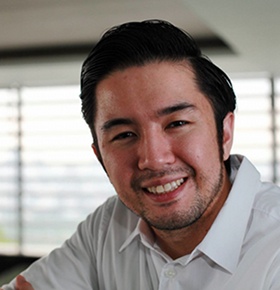SUMMARY
This is AI generated summarization, which may have errors. For context, always refer to the full article.
 Meet Gabriel la Ó, or “Chino” as he’s known to his friends and family: Through his digital magazine, Pacifiqa, he wants to bring Filipinos the stories that they don’t typically hear about. Though he later names the Atlantic, Businessweek, and Grantland as analogues of what he wants Pacifiqa to eventually be, I find Thought Catalog to be the best comparison to what they currently are.
Meet Gabriel la Ó, or “Chino” as he’s known to his friends and family: Through his digital magazine, Pacifiqa, he wants to bring Filipinos the stories that they don’t typically hear about. Though he later names the Atlantic, Businessweek, and Grantland as analogues of what he wants Pacifiqa to eventually be, I find Thought Catalog to be the best comparison to what they currently are.
Just look at a couple of their stories: Filipinos who’ve tried out the hook-up app, Tinder, and Joseph Ubalde describing how he got his job as a weatherman for TV5.
In other words, the stories on Pacifiqa speak to a certain demographic of readers who like provocative reading, but cannot necessarily commit to a full book – and these days, who can?
Of his inspiration for creating Pacifiqa, Gabriel said, “What I particularly loved were features, not necessarily hard news, but the in-depth pieces that gave readers a chance to glimpse into other people’s lives and experiences.”
Despite his best intentions, it is still hard, especially in the Philippines, which does not necessarily have the most robust reading culture, to get people’s attention.
“The biggest challenge is to get noticed, more than anything,” Gabriel shared. “A big part of gaining traction in the digital world is simply age-related; when your site is young you have a natural disadvantage when it comes to gaining an audience.”
Gaining that audience’s attention will all come down to Pacifiqa’s content. Plain and simple: It must be good, especially when you’re competing with the likes of such Facebook fodder as Elite Daily and even the Facebook newsfeed itself.
“I think from the beginning, we had a certain mindset for the stories we’d like to publish,” Gabriel said. “In the time since launch though, we’ve slowly gotten a better idea of the what the audience likes to read.”

Gabriel feels that he owes it to readers to get certain stories out there into the world.
“If a topic isn’t popular from the start, it’s a challenge for the writer and editor to package it in a way that doesn’t scream ‘BORING’ from the outset. I think we have a responsibility to make sure that unpopular issues – like a small typo in the recent bidding for the CALAX expressway, or even less popular, farming – have the best chance to be read by more people,” he said.
Gabriel also knows that he could – if he wanted to – pander to the lowest common denominator in the almighty search of clicks. “If the goal were to simply get as many page views as possible, I think most news outlets know exactly how to do that,” Gabriel said.
“Entertainment/showbiz, sex, drugs, scandal, politics – these are all topics that sell (see Jolo Estrada and Deniece Cornejo).”
Gabriel continued, “The challenge is to be able to make a story outside those topics compelling enough that people will want to share it – and you can only do that when readers think the information is interesting, useful, credible, and well-researched.”
He takes this responsibility seriously, if only because he knows how easy it is to alienate your readership. “I think a valuable lesson learned is that it’s much easier to lose the trust of your audience/market than it is to gain it. You need to make sure you know your identity from the start, and always stick to it.”
This advice comes from personal experience. “We’ve had some stories where people say, ‘Really, guys?’ and so we learn from that,” Gabriel admitted. “You’re allowed to evolve, much like our content has in the 5 months since we started, but it’s always with an eye toward improving and not merely taking shortcuts.”
Gabriel takes pride in the fact that Pacifiqa has stayed true to its core value of bringing out stories that would otherwise not have been told in the media. “I’m very proud of the in-depth pieces we’ve run on people with unique or overlooked backgrounds, like journeymen boxers or the lives of PBA referees – topics that don’t get much media coverage but we feel are important nonetheless,” Gabriel said.
“It has always been our goal to cover what we feel are underreported issues, and we’re going to keep pursuing that,” Gabriel went on.
As an example plucked from the most recent headlines, Pacifiqa did an explainer-style article on what happens to all the fallen trees as a result of Glenda. It’s the kind of angle that makes you think: What does happen to those trees? It’s an important question related to the well-being of our environment that most people will not necessarily think about first following a disaster.
Apparently, Gabriel has more tricks up his sleeve when it comes to post-Glenda coverage.
He said, “There’s a lot of good questions that need to be asked about our preparedness for storms, both for the public and private sector, and we’ll be coming out with a series of stories that we feel highlight some of the things that don’t get talked about in public enough.”
Though Pacifiqa has a social mission, it is still ultimately a business. It must attract enough readers to make it in turn attractive for advertisers to place advertisements and sponsored content on the website.
As an example, Gabriel recently got property listings site Lamudi to sponsor content on Pacifiqa. The article presents some of the most interesting and exotic property listings found on Lamudi.
On pitching to brands, Gabriel said, “I think the value of sponsored content comes from the fact that news and magazine outlets are probably the ones that have the best feel for what an audience likes to read. Readers tend to have an inherent trust for the outlets they regularly follow, and it’s part of the outlet’s responsibility to also be selective about which brands they feel can benefit their audiences.”
He added, “There’s also that saying – ‘journalists make the best PR professionals’; we basically tell stories to audiences, everyday.” – Rappler.com
Add a comment
How does this make you feel?
There are no comments yet. Add your comment to start the conversation.